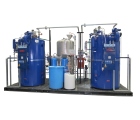Fulton maintains steam during hospital redevelopment project

Steam for a temporary central sterile-supply department (CSSD) at a hospital in Bristol is supplied by a skid-mounted dual-fuel package supplied by Fulton. The temporary CSSD is needed during North Bristol NHS Trust’s £430 million redevelopment of Southmead Hospital. Steam from the unit, which has two 60J boilers and ancillaries, is used for washing and sterilising surgical equipment and instruments.
The process at CSSD involves first rinsing surgical equipment in cold water and then washing it in hot water using steam to indirectly heat water to about 80°C. Once the instruments have been washed and repackaged, raw steam at about 180°C from the Fulton system heats the water source of the CSSD’s clean steam generator, and this steam is supplied to the steriliser at a temperature sufficient to kill any remaining pathogens, microbes and bacteria.
The Fulton 60J vertical steam boilers were specified because they have a large reservoir of super-heated water that can be flashed off to produce a considerable amount of steam — something a steam generator is not capable of.
The security of the steam supply is ensured by dual-fuel operation and the use of two boilers.
Hulley & Kirkwood was the consulting engineer.







